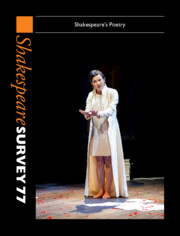Book contents
- Shakespeare Survey
- Shakespeare Survey
- Shakespeare Survey
- Copyright page
- Editor’s Note
- Contributors
- Contents
- Illustrations
- Remembering shakespeare’s Sonnets in Lucy Negro, Redux
- The Poetics of Antiquarian Accumulation in a Lover’s Complaint
- Different Samenesses
- Shakespeare’s Canvas
- ‘Persuasion by Similitude’: Finding Likeness in Shakespeare’s a Lover’s Complaint
- ‘Nothing-to-be-glossed-here’: Race in Shakespeare’s Sonnets
- Allegorical Desire, or, the Sufi ‘Phoenix and the Turtle’
- The Poetics of Shakespearian Erasure: Lyric Thinking with Bhanu Kapil and Preti Taneja
- Lucrece, Letters and the Moment of Lipsius
- Shakespeare’s Arabic Sonnets
- How to make a Formal Complaint: Sara Ahmed’s Complaint! and William Shakespeare’s a Lover’s Complaint
- They also Serve who only Stand and Write, or, how Milton Read Shakespeare’s Sonnets
- Writing Delight with Beauty’s Pen: Restoring Richard Barnfield’s Lost Credit
- Ocular Power and Female Fascinum in Shakespeare’s Venus And Adonis
- Pretty Creatures: A Lover’s Complaint, the Rape of Lucrece and Early Modern Women’s Complaint Poetry
- Lyric Voices and Cultural Encounters Across Time and Space: The Poetry of William Shakespeare and Faiz Ahmed Faiz (1911–1984)
- The thing itself or the image of that Horror: Fictions, Fascisms and We that are young
- Shakespeare’s Refugees
- Shakespeare as a Source of Dramaturgical Reconstruction
- Shakespeare, Race, Postcoloniality: The State of the Fields
- Asian Shakespeares online from Singapore
- Strange Shadows: Translating Shakespeare – The State of the Field
- Gender and Sexuality: The State of the Fields
- Shakespeare Performances in England, 2022–2023
- Productions Outside London, 2022–2023
- Professional Shakespeare Productions in the UK, January–December 2022
- The Year’s Contribution to Shakespeare Studies
- Abstracts of Articles in Shakespeare Survey 77
- Index
- References
Shakespeare Survey
Published online by Cambridge University Press: 07 November 2024
- Shakespeare Survey
- Shakespeare Survey
- Shakespeare Survey
- Copyright page
- Editor’s Note
- Contributors
- Contents
- Illustrations
- Remembering shakespeare’s Sonnets in Lucy Negro, Redux
- The Poetics of Antiquarian Accumulation in a Lover’s Complaint
- Different Samenesses
- Shakespeare’s Canvas
- ‘Persuasion by Similitude’: Finding Likeness in Shakespeare’s a Lover’s Complaint
- ‘Nothing-to-be-glossed-here’: Race in Shakespeare’s Sonnets
- Allegorical Desire, or, the Sufi ‘Phoenix and the Turtle’
- The Poetics of Shakespearian Erasure: Lyric Thinking with Bhanu Kapil and Preti Taneja
- Lucrece, Letters and the Moment of Lipsius
- Shakespeare’s Arabic Sonnets
- How to make a Formal Complaint: Sara Ahmed’s Complaint! and William Shakespeare’s a Lover’s Complaint
- They also Serve who only Stand and Write, or, how Milton Read Shakespeare’s Sonnets
- Writing Delight with Beauty’s Pen: Restoring Richard Barnfield’s Lost Credit
- Ocular Power and Female Fascinum in Shakespeare’s Venus And Adonis
- Pretty Creatures: A Lover’s Complaint, the Rape of Lucrece and Early Modern Women’s Complaint Poetry
- Lyric Voices and Cultural Encounters Across Time and Space: The Poetry of William Shakespeare and Faiz Ahmed Faiz (1911–1984)
- The thing itself or the image of that Horror: Fictions, Fascisms and We that are young
- Shakespeare’s Refugees
- Shakespeare as a Source of Dramaturgical Reconstruction
- Shakespeare, Race, Postcoloniality: The State of the Fields
- Asian Shakespeares online from Singapore
- Strange Shadows: Translating Shakespeare – The State of the Field
- Gender and Sexuality: The State of the Fields
- Shakespeare Performances in England, 2022–2023
- Productions Outside London, 2022–2023
- Professional Shakespeare Productions in the UK, January–December 2022
- The Year’s Contribution to Shakespeare Studies
- Abstracts of Articles in Shakespeare Survey 77
- Index
- References
- Type
- Chapter
- Information
- Shakespeare Survey 77Shakespeare's Poetry, pp. iiPublisher: Cambridge University PressPrint publication year: 2024

